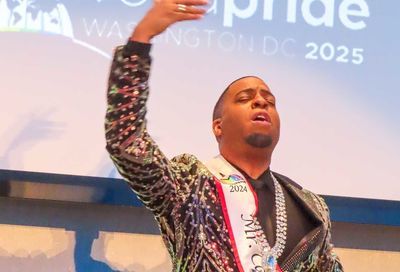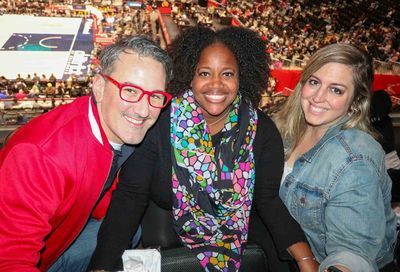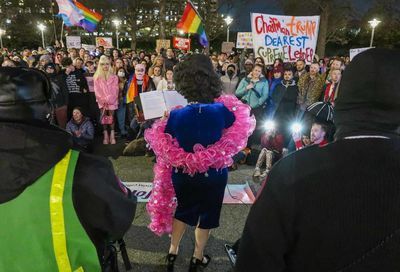Choi Trial Put on Hold After Judge Allows “Vindictive Prosecution” Defense
With reporting from court by John Riley.
The third day of the U.S. government’s trial of former Lt. Dan Choi ended with a 10-day delay for the government to seek an order from a higher court stopping the decision made today by U.S. Magistrate Judge John Facciola to allow Choi’s lawyers to argue the government singled out Choi for “vindictive prosecution.”
 Facciola said this morning that he had found there was prima facie evidence for “vindictive prosecution,” meaning enough evidence was presented to allow Choi’s lawyers to pursue such a claim. As a result, Choi’s lawyers would be able to ask for more documents and evidence from the government in order to investigate if higher-level officials advised their subordinates to try Choi in federal court rather than D.C. court and, if so, why.
Facciola said this morning that he had found there was prima facie evidence for “vindictive prosecution,” meaning enough evidence was presented to allow Choi’s lawyers to pursue such a claim. As a result, Choi’s lawyers would be able to ask for more documents and evidence from the government in order to investigate if higher-level officials advised their subordinates to try Choi in federal court rather than D.C. court and, if so, why.
The government, represented in court by Assistant U.S. Attorney Angela George, told the court that it would be filing a writ of mandamus (or a writ of prohibition) against the judge — seeking to stop the pursuit of the “vindictive prosecution” defense.
[CLARIFICATION: The U.S. Attorney’s Office clarified that if the government follows through with the filing of the writ of mandamus, it will go before U.S. District Court Chief Judge Royce Lamberth, who will rule on it. Metro Weekly initially reported that such a writ would go to the U.S. Court of Appeals for the D.C. Circuit.]
George said that if such a defense was going to go forward it should have been raised pre-trial and asked for the judge’s intentions.
Facciola responded bluntly, “I have made every effort to be as clear as humanly possible,” noting that Choi engaged in similar behavior — protesting with others against “Don’t Ask, Don’t Tell” by handcuffing himself to the White House fence — in March, April and November. In March and April, the judge said, he was treated in a similar way — but in November he was treated in an entirely different way.
The judge went on to say that he believed the prosecution was not selective in the traditional sense but rather was more subtle.
“It is impermissible,” he told the courtroom, “for the U.S. Government to prosecute differently on the basis of the content of First Amendment speech.”
A Department of Justice memorandum from its procedure manual for DOJ attorneys describes the standard in court “to establish a prima facie case of vindictive prosecution,” stating, “[A] defendant must make a ‘showing that charges of increased severity were filed because the accused exercised a statutory, procedural, or constitutional right in circumstances that give rise to an appearance of vindictiveness.'”
When Facciola asked if the governent wanted the judge to dismiss the charges, George said no.
[UPDATE @ 6:30P: For Metro Weekly‘s full report from today in court, see John Riley’s “Lawyers Spar Over Defense as Choi Trial Grinds to Abrupt Halt.”]
Support Metro Weekly’s Journalism
These are challenging times for news organizations. And yet it’s crucial we stay active and provide vital resources and information to both our local readers and the world. So won’t you please take a moment and consider supporting Metro Weekly with a membership? For as little as $5 a month, you can help ensure Metro Weekly magazine and MetroWeekly.com remain free, viable resources as we provide the best, most diverse, culturally-resonant LGBTQ coverage in both the D.C. region and around the world. Memberships come with exclusive perks and discounts, your own personal digital delivery of each week’s magazine (and an archive), access to our Member's Lounge when it launches this fall, and exclusive members-only items like Metro Weekly Membership Mugs and Tote Bags! Check out all our membership levels here and please join us today!





















